Planning an electric road trip through France? One of the first questions that comes to mind is: “How much will charging actually cost me?” Unlike filling up a petrol tank with predictable prices at every station, EV charging costs in France can vary significantly depending on where, when, and how you charge.
The good news? France offers some of the most competitive EV charging rates in Europe. The even better news? Understanding the pricing structure is simpler than you might think, and with the right knowledge, you can significantly reduce your charging expenses.
In this comprehensive guide, we’ll break down exactly what you’ll pay to keep your electric vehicle charged across France, from the cheapest options to premium fast-charging rates, helping you budget accurately for your French EV adventure.
Quick Answer: The Average Cost Overview
Before we dive into the details, here’s what you can expect to pay on average:
Home Charging (if available): €0.15-0.22 per kWh (approximately €2-3 for a full charge)
Public AC Charging (slow/medium speed): €0.25-0.45 per kWh
Public DC Fast Charging (highway): €0.45-0.70 per kWh
Premium Fast Charging Networks: €0.50-0.79 per kWh
To put this in perspective, driving 100 kilometers in an average electric vehicle (consuming 18 kWh/100km) costs between €4.50-12.60 depending on where and how you charge, compared to €12-18 for a comparable petrol vehicle at current French fuel prices.
[INTERNAL LINK: Best EV Charging Apps for Tourists Visiting France in 2025] will help you find the most economical charging options wherever you travel.
Understanding France’s EV Charging Pricing Structure
Unlike petrol stations where prices are clearly displayed per liter, EV charging in France uses several different pricing models. Understanding these will help you avoid surprises on your bill.
Pricing Model #1: Per Kilowatt-Hour (kWh)
This is the most common and transparent pricing method, similar to how you pay for electricity at home. You pay for the actual energy delivered to your vehicle.
How it works: If a station charges €0.40 per kWh and you add 30 kWh to your battery, you pay €12.00.
Where you’ll find it: Most public charging networks, shopping center chargers, and municipal stations use this model.
Advantage for tourists: Easy to calculate costs in advance and compare prices between different networks.
Pricing Model #2: Per Minute
Some networks, particularly older installations, charge based on charging duration rather than energy delivered.
How it works: Stations charge a set rate per minute (typically €0.10-0.30/minute), regardless of charging speed.
The catch: Your actual cost depends on your vehicle’s charging speed and current battery level. A car charging at 50 kW pays the same per minute as one charging at 150 kW, making this model less favorable for vehicles with slower charging capabilities.
Where you’ll find it: Increasingly rare, but still present at some municipal networks and older installations.
Pricing Model #3: Flat Session Fee + Per kWh
Some networks combine a session initiation fee with per-kWh pricing.
How it works: You might pay €1 to start the session, then €0.35 per kWh for the energy delivered.
Strategic consideration: This model favors longer charging sessions. If you’re topping up with just 5-10 kWh, the session fee significantly increases your effective per-kWh cost.
Pricing Model #4: Subscription-Based Pricing
Many networks offer subscription plans with reduced per-kWh rates in exchange for a monthly fee.
How it works: Pay €10-20 monthly and get reduced charging rates (typically 20-40% discount).
Worth it for tourists? Generally only if you’re staying in France for several weeks and plan extensive charging. For short trips, pay-as-you-go rates are more economical.
[INTERNAL LINK: Understanding French EV Charging Payment Methods: Cards, Apps, and RFID] explains how to set up payment for each model.
Detailed Cost Breakdown by Charging Speed
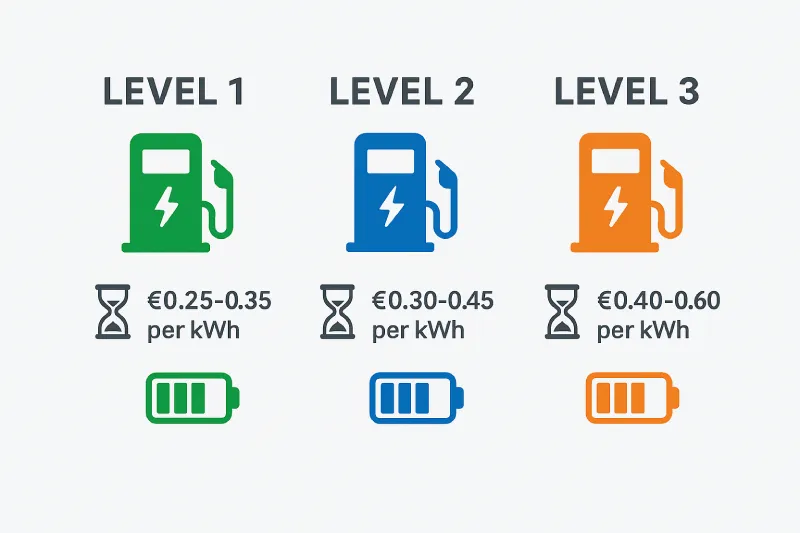
The charging speed you choose dramatically affects your costs. Here’s what you’ll pay at each level:
Level 1: Slow AC Charging (3.7-7 kW)
Typical Cost: €0.25-0.35 per kWh Charging Time: 4-8 hours for full charge Cost per 100km: €4.50-6.30
Where you’ll find it: Street parking, residential areas, workplace chargers, some hotels
Best for: Overnight charging, workplace parking, long sightseeing stops
Real-world example: Charging a Renault Zoe (52 kWh battery) from 20% to 80% costs approximately €9-11 and takes 5-6 hours.
Level 2: Medium AC Charging (11-22 kW)
Typical Cost: €0.30-0.45 per kWh Charging Time: 2-4 hours for substantial charge Cost per 100km: €5.40-8.10
Where you’ll find it: Shopping centers, restaurants, tourist attractions, municipal parking
Best for: Meal breaks, shopping trips, afternoon activities
Real-world example: A Volkswagen ID.4 adding 40 kWh during a 3-hour lunch and shopping trip costs €12-18.
Level 3: Fast DC Charging (50-100 kW)
Typical Cost: €0.45-0.60 per kWh Charging Time: 30-45 minutes for 80% charge Cost per 100km: €8.10-10.80
Where you’ll find it: Highway rest areas, urban charging hubs, some supermarkets
Best for: Highway travel, quick top-ups during road trips
Real-world example: Tesla Model 3 charging from 20% to 80% (adding 45 kWh) costs €20-27 in 35-40 minutes.
Level 4: Ultra-Fast DC Charging (150-350 kW)
Typical Cost: €0.50-0.70 per kWh Charging Time: 15-25 minutes for 80% charge (vehicle dependent) Cost per 100km: €9.00-12.60
Where you’ll find it: Major highways (Ionity, Izivia, Tesla Superchargers)
Best for: Long-distance highway travel when time is limited
Real-world example: Porsche Taycan charging from 10% to 80% (60 kWh) at 270 kW costs €30-42 in just 18-22 minutes.
Major Charging Network Pricing Comparison
Different networks have different pricing strategies. Here’s what you’ll pay at France’s major charging providers:
Tesla Supercharger Network
For Tesla Owners:
- €0.37-0.52 per kWh (varies by location and time)
- Some stations have peak/off-peak pricing
- No membership fee required
For Non-Tesla EVs:
- Recently opened to other brands at select locations
- Pricing typically €0.55-0.70 per kWh for non-Tesla vehicles
- Requires Tesla app with payment method
Coverage: 100+ Supercharger stations across France, primarily on major highways
Cost for 100km: €6.66-9.36 (Tesla owners), €9.90-12.60 (non-Tesla)
Ionity Network
Standard Rate:
- €0.69-0.79 per kWh without subscription
- Among the most expensive public charging in France
With Automaker Partnership:
- Many car manufacturers offer Ionity subscriptions (€10-15/month)
- Reduced rates of €0.30-0.35 per kWh with subscription
Coverage: 70+ ultra-fast charging hubs on French highways
Best for: Highway travelers with manufacturer subscription plans
Cost for 100km: €12.40-14.20 (standard), €5.40-6.30 (with subscription)
Izivia (EDF Group)
Pay-as-you-go:
- Highway stations: €0.54-0.60 per kWh
- Urban stations: €0.38-0.48 per kWh
Izivia Pass Subscription:
- €12/month for discounted rates
- Highway: €0.48-0.52 per kWh
- Urban: €0.32-0.40 per kWh
Coverage: 350+ fast-charging stations, primarily on highways
Cost for 100km: €9.72-10.80 (highway, standard rate)
TotalEnergies
Pricing:
- Standard AC charging: €0.32-0.40 per kWh
- Fast DC charging: €0.48-0.56 per kWh
Loyalty program: Frequent users can access reduced rates
Coverage: 200+ stations at TotalEnergies fuel stations
Cost for 100km: €8.64-10.08 (DC fast charging)
Chargemap Pass
Not a network, but a payment solution that works across multiple networks:
One-time card fee: €19.90 Pricing: Varies by network, typically 10-20% discount vs. standard rates Access: 400,000+ charging points across Europe
Best for: Tourists who want payment simplification across multiple networks
[INTERNAL LINK: Best EV Charging Apps for Tourists Visiting France in 2025] provides detailed comparison of payment solutions.
Municipal Networks (Various Cities)
Pricing: €0.20-0.40 per kWh (often among the cheapest) Coverage: City centers, public parking, tourist areas Payment: Usually requires specific city app or RFID card
Examples:
- Paris (Belib’): €0.25-0.35 per kWh
- Lyon: €0.28-0.40 per kWh
- Bordeaux: €0.30-0.38 per kWh
Cost for 100km: €4.50-7.20
Free Charging: Where to Find It in 2025
While less common than in previous years, free charging still exists in France. Here’s where to look:
Shopping Centers and Retail
IKEA: Most French IKEA stores offer free medium-speed (11-22 kW) charging for customers. Typical 2-hour shopping visit adds 20-40 kWh.
Auchan, Carrefour, E.Leclerc: Some locations offer free slow charging (limited duration, usually 2-3 hours).
Automotive Dealerships: Many electric vehicle dealerships (Renault, Tesla, BMW) offer complimentary charging for customers and prospective buyers.
Hotels and Accommodations
Increasing numbers of hotels include free charging as an amenity, particularly:
- Business hotels near highways
- Eco-certified accommodations
- Rural guesthouses promoting sustainable tourism
Pro tip: Always verify charging availability and any associated costs when booking. Use [INTERNAL LINK: Charging Your Electric Car at French Hotels: What You Need to Know] for detailed guidance.
Tourist Attractions and Municipalities
Some tourist regions offer free charging to encourage sustainable tourism:
- Select ski resorts in the French Alps
- Wine tourism destinations in Bordeaux and Burgundy
- Coastal towns promoting eco-tourism
Finding free chargers: Use Chargemap or PlugShare apps and filter by “free” charging to identify current locations.
Time-Based Pricing: When to Charge for Best Rates
Some charging networks in France have implemented dynamic pricing based on demand and time of day.
Peak vs. Off-Peak Pricing
Peak Hours (typically 7-10 AM and 5-8 PM):
- Rates can be 20-40% higher
- €0.50-0.70 per kWh at fast chargers
Off-Peak Hours (11 PM – 6 AM):
- Significantly reduced rates
- €0.30-0.45 per kWh at the same locations
Midday (11 AM – 3 PM):
- Moderate rates
- €0.38-0.55 per kWh
Strategic Charging Times
For maximum savings:
- Charge overnight at accommodations when possible
- Avoid highway charging during weekday evening rush hours
- Take advantage of lunch-hour rates (typically lower than peak)
- Weekend rates are often lower than weekdays
Regional Pricing Variations Across France
Charging costs aren’t uniform across the country. Here’s what to expect by region:
Paris and Île-de-France
Average costs: Slightly above national average due to high demand
- AC charging: €0.30-0.45 per kWh
- DC fast charging: €0.50-0.65 per kWh
Money-saving tip: Municipal Belib’ network offers competitive rates at €0.25-0.35 per kWh
[INTERNAL LINK: Where to Charge Your Electric Car in Paris: Top 10 Convenient Locations] helps you find the best-priced stations in the capital.
French Riviera (Côte d’Azur)
Average costs: Among the highest in France, especially in summer
- AC charging: €0.35-0.50 per kWh
- DC fast charging: €0.55-0.70 per kWh
Why higher? Tourist demand and premium locations drive up prices
French Alps
Average costs: Variable by season
- Winter (ski season): €0.40-0.60 per kWh
- Summer: €0.30-0.45 per kWh
Resort charging: Often included with accommodation or parking fees
Rural Regions (Loire Valley, Burgundy, Provence)
Average costs: Generally the most affordable
- AC charging: €0.25-0.38 per kWh
- DC fast charging: €0.42-0.55 per kWh
Availability: Less dense network requires more planning
[INTERNAL LINK: Provence Electric Car Route: Best Charging Stops for Your Journey] provides cost-effective routing through southern France.
Highway Corridors
Average costs: Highest rates due to convenience premium
- Fast charging: €0.54-0.70 per kWh
- Ultra-fast charging: €0.60-0.79 per kWh
Alternative strategy: Exit highways to charge at nearby town municipal networks for 30-40% savings if time permits.
Cost Comparison: EV vs. Petrol in France (2025)
Let’s compare the real-world costs of driving 1,000 kilometers through France:
Electric Vehicle (Average consumption: 18 kWh/100km)
Scenario 1: Optimal charging (mix of free and cheap AC)
- Energy needed: 180 kWh
- Average cost: €0.30/kWh
- Total cost: €54
Scenario 2: Realistic tourist charging (mix of AC and highway DC)
- Energy needed: 180 kWh
- Average cost: €0.45/kWh
- Total cost: €81
Scenario 3: Premium fast charging only (all highway)
- Energy needed: 180 kWh
- Average cost: €0.60/kWh
- Total cost: €108
Petrol Vehicle (Average consumption: 6.5L/100km)
- Fuel needed: 65 liters
- Current average petrol price: €1.85/liter
- Total cost: €120
Diesel Vehicle (Average consumption: 5.5L/100km)
- Fuel needed: 55 liters
- Current average diesel price: €1.75/liter
- Total cost: €96
Verdict: Even with premium fast charging, EVs remain cost-competitive. With strategic charging, EVs offer 30-55% savings compared to fossil fuels.
Money-Saving Strategies for EV Charging in France
Strategy #1: The “Anchor Charging” Method
Charge fully at your accommodation each night rather than relying on expensive highway fast charging.
Savings potential: Up to 50% compared to highway-only charging
How to implement:
- Book accommodations with charging facilities
- Request slow charging overnight (cheapest rates)
- Start each day with 100% battery
Strategy #2: Meal-Based Charging
Plan your lunch and dinner stops around medium-speed chargers at restaurants or shopping areas.
Savings potential: 25-35% compared to highway stops
How to implement:
- Use apps to find restaurants near AC chargers
- A 90-minute meal provides 20-40 kWh at slower but cheaper rates
- Enjoy French cuisine while your car charges
Strategy #3: Municipal Network Priority
Use city and town municipal charging networks whenever possible.
Savings potential: 30-45% compared to commercial fast charging
How to implement:
- Download municipal charging apps for cities on your route
- These typically offer the most competitive rates
- Often located near town center attractions
Strategy #4: Subscription Evaluation
If staying more than 2 weeks and driving extensively, calculate if a network subscription saves money.
Break-even example:
- Izivia Pass: €12/month
- Saves approximately €0.10/kWh
- Breaks even after 120 kWh (about 650km of highway driving)
Strategy #5: Off-Peak Timing
Where dynamic pricing exists, shift charging to off-peak hours.
Savings potential: 20-40% at participating networks
How to implement:
- Charge during lunch (11 AM – 3 PM) rather than evening
- Use overnight charging whenever available
- Avoid 5-8 PM peak charging
Hidden Costs to Be Aware Of
Beyond the per-kWh or per-minute charges, watch for these additional costs:
Idle Fees (Overstay Charges)
What it is: Penalty fees if you leave your car connected after charging completes
Typical cost: €0.30-0.60 per minute after grace period
How to avoid: Set phone alerts for charging completion, return promptly to move your vehicle
Networks that charge this: Tesla Superchargers (when busy), Ionity, some Izivia locations
Session Activation Fees
What it is: One-time fee to initiate charging session
Typical cost: €0.50-2.00 per session
Impact: Significantly increases cost for small top-ups
How to minimize: Charge for longer durations when session fees apply
RFID Card Fees
What it is: Physical card required for some networks
Typical cost: €10-20 one-time purchase
Worth it? Yes, if you plan multiple charging sessions on that network. Otherwise, use app-based payment.
Roaming Fees
What it is: Additional markup when using charging card from one network at another network’s stations
Typical cost: 10-25% surcharge
How to avoid: Use apps that consolidate multiple networks without roaming fees (Chargemap Pass, PlugShare)
Parking Fees
What it is: Some charging locations also charge for parking separate from electricity
Typical cost: €2-5 per hour
Watch for: Urban charging stations where parking meters operate independently
Payment Methods and Cost Optimization
Credit/Debit Cards
Acceptance: Increasing at newer stations, but not universal Fees: Usually no additional fees beyond the kWh rate Best for: One-off charging sessions
Charging Apps
Popular options: Chargemap, PlugShare, Shell Recharge Fees: Generally no additional fees, some offer discounts Best for: Tourists wanting consolidated billing
[INTERNAL LINK: Best EV Charging Apps for Tourists Visiting France in 2025] compares payment options and fees.
RFID Cards
Availability: Network-specific cards Fees: €10-20 initial purchase Best for: Frequent users of specific networks
Subscription Plans
Availability: Most major networks Monthly cost: €10-20 Best for: Extended stays with high charging frequency
Special Considerations for Different Vehicle Types
Tesla Vehicles
Supercharger access: Built-in advantage with competitive pricing Average cost: €0.37-0.52 per kWh Cost per 100km: €6.66-9.36
Money-saving tip: While Superchargers are convenient, municipal networks are often 30-40% cheaper for non-urgent charging.
Large Battery EVs (80+ kWh)
Considerations: Full charges at premium rates can exceed €50-60 Strategy: Rarely charge to 100%; plan for 20-80% charging cycles Savings: Charging 60 kWh instead of 80 kWh saves €10-14 per session
Small Battery EVs (40-50 kWh)
Advantage: Lower total costs per charge Strategy: Can afford to use faster charging more often due to smaller total cost Typical full charge cost: €15-25 even at highway rates
Plug-in Hybrids (PHEVs)
Battery size: 10-20 kWh typically Advantage: Extremely low total charging costs (€3-8 per full charge) Strategy: Maximize EV mode by charging whenever convenient, even at premium rates
Budgeting Your French EV Road Trip
Here’s how to estimate your charging costs based on trip type:
Weekend City Break (200km total)
Charging needed: ~36 kWh Optimal strategy: Hotel charging + municipal networks Estimated cost: €9-15
Week-Long Tour (1,000km)
Charging needed: ~180 kWh Optimal strategy: Accommodation charging + meal-time AC charging Estimated cost: €54-85
Two-Week Grand Tour (2,500km)
Charging needed: ~450 kWh Optimal strategy: Mixed accommodation, municipal, and selective highway fast charging Estimated cost: €150-220
Daily Budget Rules of Thumb
Light driving (100-150km/day): €5-12 per day Moderate driving (200-300km/day): €12-22 per day Heavy driving (400-500km/day): €25-40 per day
Cost-Saving Route Planning
The Loire Valley Château Circuit (500km loop)
Standard highway route:
- Highway fast charging: 3 sessions × €20 = €60
Optimized route:
- Overnight hotel charging: 1 session × €12 = €12
- Restaurant AC charging: 2 sessions × €15 = €30
- Total: €42 (30% savings)
Paris to Nice (900km)
Standard approach:
- 4 highway fast charges × €25 = €100
Optimized approach:
- Overnight charging in Lyon: €15
- Lunch stops with AC: 2 × €12 = €24
- Final highway fast charge: €25
- Total: €64 (36% savings)
[INTERNAL LINK: EV Charging Between Paris and Lyon: Best Stops for Your Road Trip] provides detailed routing strategies.
Future Cost Trends: What to Expect
Government Initiatives
France has committed to expanding charging infrastructure with 100,000 additional public charging points by 2030. Increased competition may drive prices down.
Renewable Energy Integration
Some networks are beginning to offer reduced rates during high renewable energy production periods (windy or sunny days).
Smart Charging Programs
Dynamic pricing will likely become more sophisticated, offering deeper discounts for flexible charging times.
Subscription Model Evolution
Expect more bundled offerings from automakers including charging subscriptions with vehicle purchases.
Quick Reference: Charging Cost Cheat Sheet
Print this out for your trip:
| Charging Type | Location | Typical Cost/kWh | Cost per 100km |
|---|---|---|---|
| Free | Shopping centers, dealerships | €0.00 | €0.00 |
| Slow AC (3-7 kW) | Street, residential | €0.25-0.35 | €4.50-6.30 |
| Medium AC (11-22 kW) | Shopping, restaurants | €0.30-0.45 | €5.40-8.10 |
| Fast DC (50-100 kW) | Highway, urban hubs | €0.45-0.60 | €8.10-10.80 |
| Ultra-fast (150+ kW) | Major highways | €0.50-0.70 | €9.00-12.60 |
| Premium networks | Ionity (no sub) | €0.69-0.79 | €12.40-14.20 |
Based on average consumption of 18 kWh/100km
Frequently Asked Questions
Is charging an electric car in France more expensive than in other European countries?
France generally offers mid-range pricing compared to other European countries. It’s more affordable than Germany or UK for highway charging, but slightly more expensive than Spain or Portugal. Overall, France provides good value, especially when using municipal networks.
Do charging costs increase during peak tourist season?
Some tourist-heavy regions (French Riviera, Alps) see modest price increases during peak season, but most networks maintain consistent pricing year-round. Availability can be more challenging during peak season, so plan charging stops in advance.
Can I negotiate charging rates or get tourist discounts?
Individual charging rates are fixed, but some networks offer promotional codes or first-time user discounts. Check individual network apps for current promotions. Tourist-specific discounts are rare, but using the right apps and cards can save 15-25%.
What’s the most expensive mistake tourists make with EV charging in France?
The biggest mistake is relying exclusively on premium highway fast-charging networks like Ionity without subscription plans. This can cost 40-60% more than mixed charging strategies. Plan ahead and diversify your charging sources.
Are there any hidden fees I should watch out for?
Yes, watch for idle fees (overstaying after charging completes), session activation fees (fixed charge per charging event), and parking fees at some locations. Always check the complete pricing structure in the app before starting your session.
How do charging costs compare during different times of day?
Networks with dynamic pricing typically charge 20-40% more during peak hours (evening rush hour) compared to off-peak times (late night, early morning, midday). Whenever possible, avoid 5-8 PM charging for the best rates.
Is it cheaper to charge at hotels or public charging stations?
Hotel charging varies widely. Some include it free with your stay, others charge premium rates (€0.50-0.70/kWh). Always clarify costs when booking. Generally, hotels are convenient but not the cheapest option unless included free.
Should I get a subscription if I’m visiting France for two weeks?
It depends on your driving distance. If you’ll charge more than 120-150 kWh during your stay (covering about 700-850km of highway driving), subscriptions like Izivia Pass or Ionity partner plans usually save money. For shorter trips, pay-as-you-go is more economical.
Conclusion: Mastering EV Charging Costs in France
Charging an electric vehicle in France doesn’t have to be expensive or complicated. With the right knowledge and strategic planning, you can enjoy all the benefits of electric driving while keeping your costs reasonable and predictable.
The key takeaways for cost-conscious EV tourists:
Diversify your charging: Mix free accommodation charging, affordable municipal networks, and strategic fast charging to optimize costs.
Plan around meals: French cuisine and EV charging are perfect companions. A leisurely lunch provides plenty of time for economical medium-speed charging.
Use the right tools: Apps like Chargemap and PlugShare help you find the most affordable options wherever you travel. Best EV Charging Apps for Tourists Visiting France in 2025 guides you through setting up your charging apps.
Avoid premium prices when possible: Highway fast charging is convenient but expensive. When time allows, exit to nearby towns for 30-40% savings.
Think ahead: Charge overnight at accommodations, book hotels with charging facilities, and plan your daily routes around cost-effective charging locations.
France’s expanding EV infrastructure, competitive pricing (especially at municipal networks), and growing network of charging options make it one of Europe’s best destinations for electric vehicle tourism. With over 160,000 charging points and more being added monthly, you’ll find that range anxiety is replaced by choice anxiety—deciding among multiple convenient options.
For comprehensive location information and tourist-friendly charging resources, visit FranceChargeFinderOnline to plan your electric French adventure with confidence.
Ready to explore France electrically? With charging costs now clearly understood, all that’s left is to plan your route, download your apps, and hit the open road—cleanly, quietly, and affordably.

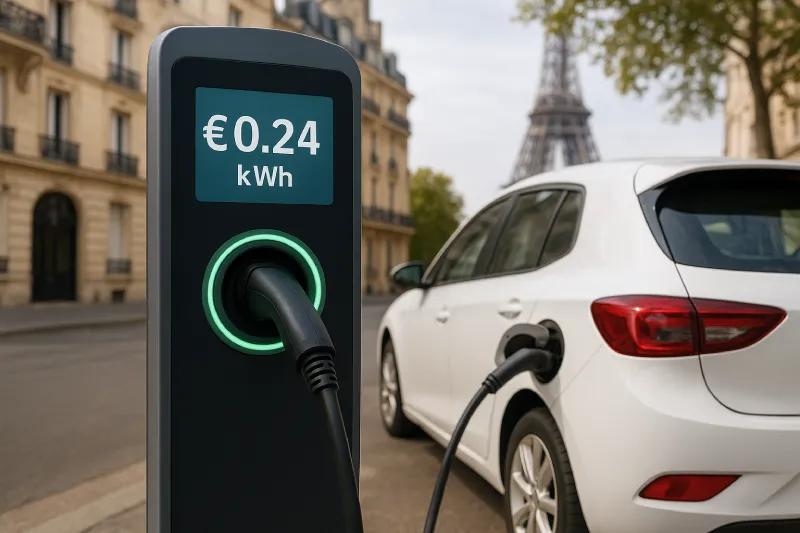
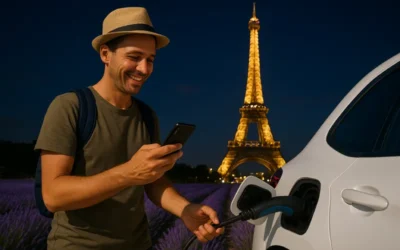
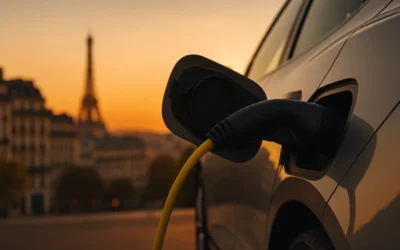
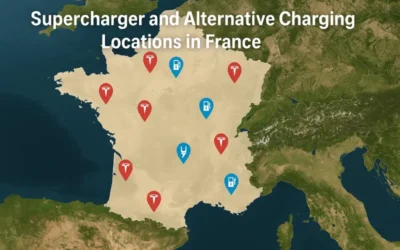
Leave a Reply